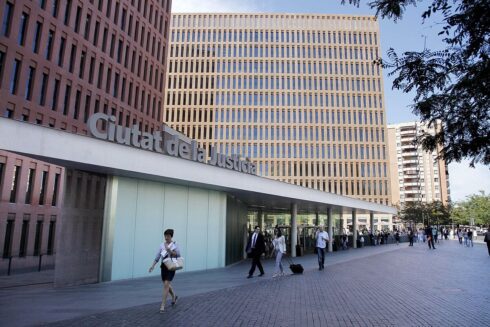THOUSANDS took to the streets across Catalunya on Wednesday to celebrate the region’s national day, known as La Diada, but the total turnout was the lowest on record as levels of support for the independence movement appear to dwindle.
Some 60,000 residents participated in nationalist demonstrations in Barcelona, alongside 6,500 in Girona, 3,000 in Lleida, 2,800 in Tarragona and 1,200 in Tortosa.
However, this year’s turnout was the lowest since 2012, when the Catalan National Assembly started organising annual pro-independence rallies to coincide with the September 11 celebrations.
The festival coincides with the anniversary of the fall of Barcelona during the War of the Spanish Succession in 1714, and has come to symbolise the widely-held belief that Catalunya has been historically oppressed by the rest of Spain.
Between 2012 and 2019, the La Diada demonstrations were attended by over a million people each year amid calls for Catalan independence, culminating in the 2017 referendum, which was deemed illegal, and a unilateral declaration of independence which led to the Catalan regional parliament being dissolved by Mariano Rajoy, the Spanish prime minister at the time.
Since the Covid-19 pandemic, the Catalan independence movement has been paralysed in crisis as voters grow disenchanted with a decade-long process which has provoked political and economic instability.

The movement has also been quelled by the rise of the Socialists in Madrid, who have adopted a more tolerant approach towards the Catalan question than the hardline stance taken by the conservative Partido Popular (PP).
Earlier this summer, the Socialist ally of Prime Minister Pedro Sanchez, Salvador Illa, was voted in as the region’s president, becoming the first pro-unity politician to take office in 14 years.
In a televised speech celebrating La Diada, Illa called for ‘unity’ and stressed that Catalunya’s national day ‘belongs to all Catalans’, representing a sharp departure from the rhetoric of his predecessors, including the exile Junts per Catalunya leader Carles Puigdemont, who used the celebrations to mobilise support for independence.
According to surveys carried out by the Center for Opinion Studies, the proportion of residents who consider themselves as Catalan has plummeted over the last decade.
Between 2014 and 2024, the proportion of people who consider themselves to be ‘only Catalan’ has fallen from 29.1% to 18%/
The fall is most pronounced amongst young people, where the feeling of Catalan identity has fallen from 29.3% to 11.4%, meaning the 18-24 age bracket has the weakest support for Catalan identity.








